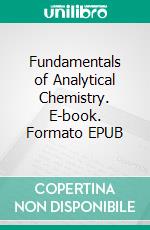D K Sarkar eBooks
eBooks di D K Sarkar
Fundamentals of Analytical Chemistry. E-book. Formato EPUB D K Sarkar - Bsp Books, 2021 -
Analytical chemistry, a subject of paramount importance, is performed by persons with diverse interests. Some of the principal users of the subject include the students and researchers of basic science, pharmacy, medicine and clinical diagnosis, veterinary, agriculture and biology, the analysts of the laboratories of criminology and forensic science, environmental pollution monitoring agencies, pesticide residues, food safety standards, and those concerned with the quality control laboratories of the industries. All these analysts execute the quantitative assay of the substances of their interests and concerns. Apparently, the gamut of operations of the task of the analysts seems to be very mechanical and revolves around a set procedure in a set pattern and then securing the results in a preset fashion. In reality, the notion, is however, summarily wrong. The task in essence runs into a depth far beyond what one unconcerned with the subject may otherwise perceive. In practice, an analytical chemist must have an inquisitive mind and complete command - in terms of theory, practice, and skill - of every single operation, regardless of its being very small, simple, rudimentary, and trivial, that he performs in the course of the analysis. An analyst is simply incomplete in his forte sans this command and knowledge in totality. Indeed, a total understanding of the theory of analysis is a prerequisite for acquiring an authority on the skill involved in the benchwork segment of the task. An analyst thus must have a crystal clear knowledge of the reasoning and logic of adding a particular reagent at a particular point of time. This reasoning, sense, and logic provoke an analyst to look for substitutes that are even better than what is cited in the manual; eventually, it leads to more precise and accurate results of the analysis, The analyst must also be fully aware of the reasons for maintaining specific reaction conditions such as pH, temperature, ionic strength, atmospheric pressure, time, etc. during the course of the analysis, the consequences of not adhering to the defined conditions, the necessity of standardizing a method of analysis with recovery check, and the derivation of an established formula in the segment on calculations. The task of an analyst must not end with jotting down the results in the record book; rather, the analyst should examine the results and think and rethink, if there is any scope for drawing a meaningful correlation, conclusion, and practical application from the results of the analysis. In case of results far off the true or expected marks, the analyst should ponder for what, where, and when, the task went wrong, so that the erred step/s or the faulty chemical/s can be corrected or skipped or substituted as it may warrant. To that extent, the analyst must document, publish and make others aware of the lapses so that the wrong results do not recur in the future by him or someone else. This book is an attempt in arousing these aspects in the inquisitive mind of an analytical chemist. Besides, there was a feeling that there is every need for a book on the basics of analytical chemistry in an easily comprehendible language, more so for the graduate level students of basic and applied sciences.
